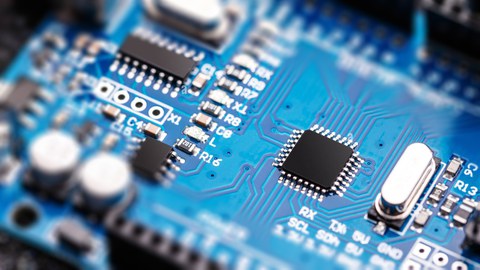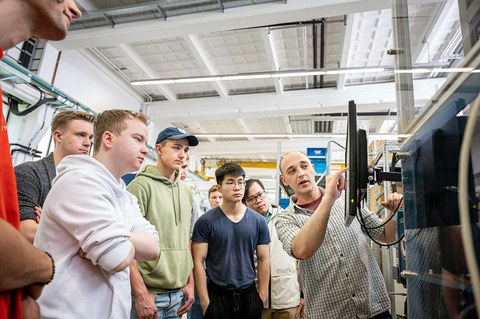Electrical engineering and information technology
The degree program in the Vocational Department of Electrical Engineering and Information Technology (ETIT) qualifies students to complete their teacher training at a vocational school (vocational school, vocational college, technical college, vocational grammar school, etc.) in the vocational 1 of "Electrical Engineering" and - especially in combination with the second subject of Computer Science - in the vocational field of "Information Technology" and then to teach in the vocational field as a teacher. This means that graduates are able to teach in the assigned professions after completing their studies.
Table of contents
- Elektroanlagenmonteur:in
- Elektroniker:in
- für Automatisierungstechnik
- für Betriebstechnik
- für Gebäude- und Infrastruktursysteme
- für Geräte und Systeme
- für Informations- und Systemtechnik
- für Maschinen und Antriebstechnik
- Energie- und Gebäudetechnik
- Informations- und Telekommunikationstechnik
- Fluggeräteelektroniker:in
- Industrieelektriker:in
- Betriebstechnik
- Geräte und Systeme
- Informations- und Telekommunikationssystem-Elektroniker:in
- Informationselektroniker:in
- Mechatroniker:in
- Mikrotechnologe:technologin
- Systemelektroniker:in
fett = „Kernberufe“; normal = weitere oft zugeordnete Berufe
Subject combinations
In addition to other general education subjects (e.g. computer science, mathematics, English, etc.), the Department can also be combined with the second subject area of chemical engineering or metal and machine technology (MMT).
The advantage of combining the departments of ETIT and MMT is that the increasingly relevant interlinking of the fields of metal, electrical and information technology (in energy, automation, appliance, production, building or vehicle technology) can be better penetrated and passed on. In this combination, for example, the mechatronic professions of "mechatronics technician", "mechatronics technician for refrigeration technology" or "production technologist" are (almost) completely covered.
Study
The basis for the university education in the vocational department of "Electrical Engineering and Information Technology" are various corresponding engineering sciences, especially electrical engineering, including the basics of electrical engineering, electrical and magnetic fields, dynamic networks, electrical energy and microcomputer technology.
This is supplemented by the subject areas of mathematics, mechatronics and information technology. Depending on the area of specialization, other subjects in the specialist sciences include, for example, content from the fields of computer science, assembly and connection technology, automation technology, measurement and sensor technology, circuit technology, fundamentals of electrical power supply systems, signal processing and communications engineering.
The Department continues to address important aspects of the professional field in research and teaching. For example, it also deals with the future and further development of supply systems from generation to distribution (e.g. smart grid), microtechnology and complex information systems and the problems that arise with them, such as the intransparency of processes and security, the question of the associated challenge of abstraction, which must also be taken into account for teaching and didactics.
Professional didactics as a core element of teacher training should be learned to analyze the competencies that come into play in the processes, to plan the competence development of the learners and to systematically prepare the diverse (teaching) content, to design, implement and reflect on the lessons in a way that is appropriate for the target group.
(cf. Pahl, J.-P./Herkner, V. (eds.) (2010): Handbuch berufliche Fachrichtungen. Bielefeld. 416-446.)
Current courses of the Chair of Metals and Machine Technology / Vocational Didactics for the Department of Electrical Engineering and Information Technology.
LEMMA - Teaching-related community platform for students and teachers of the Departments ETIT, FZT and MMT as well as OptLA students.
Have we piqued your interest?
Further information can be found under the following links
- Teacher training in general,
- Teacher Training - Vocational Schools and
- Study options for the technical teaching degree at vocational schools.
Footnotes
-
Although the Vocational Department and the Vocational Field are referred to identically, there is an important difference. While the vocational department refers to the field of study and thus the structure of teacher training at universities, the term occupational field refers to the assignment of individual (related) professions. Consequently, the degree course prepares you to teach in the assigned professions - regardless of the current lack of a systematic and formally valid classification. This is a key difference compared to general education, which prepares you for a subject.


